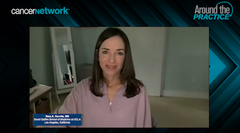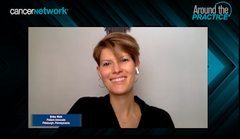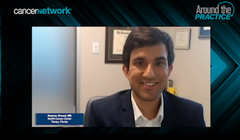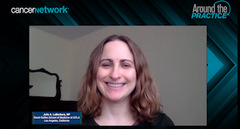
Chemotherapy for HER2+ MBC
The rationale for treating Erika Rich, a patient with HER2-positive metastatic breast cancer, with docetaxel, trastuzumab, and pertuzumab.
Episodes in this series

Sara A. Hurvitz, MD: As I understand your story, you were 25 years old when you presented, and you had a mass that was just over 3 cm. It was biopsied. Biopsy is, of course, the first step when we find an abnormal finding in the breast, and it was invasive ductal carcinoma that was hormone receptor–negative and HER2 [human epidermal growth factor receptor 2]–positive. Staging scans were done given the locally advanced nature of the disease at your presentation. They showed metastases, not only in the regional lymph nodes but also the liver and bones with a lytic lesion in the subtrochanteric region. Tell me about your initial treatment that you received from a medical perspective—not surgery or radiation. What medicines were you given initially?
Erika Rich: Initially, when I was first in Nashville [Tennessee], they did want to start me on a different regimen. I moved to Pittsburgh [Pennsylvania] once I got a second opinion. They had me on Taxotere [docetaxel], Herceptin [trastuzumab], and Perjeta [pertuzumab] for the first 6 months of my treatment.
Sara A. Hurvitz, MD: The THP [trastuzumab, pertuzumab, docetaxel] regimen is the standard-of-care first-line regimen. That’s what you received initially. How did you do with that?
Erika Rich: I did really well because I was so young and I had no family history. It was what expected. I thought I was going to be in the hospital bedridden, but I took that as a time to visit my friends. I was very active. They did give me some medicine to help with things like nausea. That allowed me more freedom, so I spent a lot of time traveling during that time. I felt well.
Sara A. Hurvitz, MD: That’s amazing. It’s really good to hear. Were you having pain in your hip? You mentioned back pain. Were you also having pain in the area where they saw lesions in the bones?
Erika Rich: Yes, I was having significant pain in that area. For my entire life I’d played soccer, until I graduated from college. So I just thought it was from that because I’d always gone into my seasons injured. I didn’t second guess whenever my back was hurting, but I did go to Disney World the month before I got diagnosed and started noticing things. It was excruciating pain. I was having to miss out on a lot of the activities that my family was partaking of because I couldn’t keep up with them. I wrote it off as back pain.
Transcript edited for clarity.
Newsletter
Stay up to date on recent advances in the multidisciplinary approach to cancer.







































